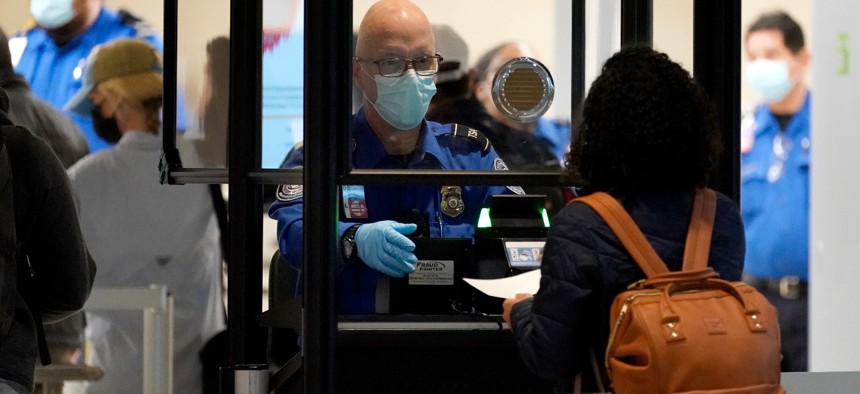Biden Administration to Grant TSA Employees Full Collective Bargaining Rights, Better Pay
DHS Secretary Alejandro Mayorkas ordered Transportation Security Administrator David Pekoske to align employees’ rights with those enjoyed by the vast majority of federal workers, including access to the General Schedule pay system.
The Biden administration on Thursday announced that it would extend full Title 5 federal employee protections to workers at the Transportation Security Administration, granting full collective bargaining rights, access to the Merit Systems Protections Board, and better pay.
Since TSA was established following the September 11 terrorist attacks, the agency has had wide latitude to develop its own workforce policies. As a result, TSA screeners have suffered through chronically low pay, a lack of union and due process protections—abridged collective bargaining rights were only granted in 2011—enjoyed by most other federal workers. The agency has consistently seen higher turnover and lower morale than most other federal agencies.
In a memo on Thursday, Homeland Security Secretary Alejandro Mayorkas instructed TSA Administrator David Pekoske to change the agency’s workforce policies to conform with Title 5 of the U.S. Code, citing President Biden’s executive order aimed at promoting collective bargaining in both the public and private sectors.
Under Mayorkas’ directive, Pekoske must permit TSA employees to collectively bargain “to the same extent as permitted” by most other federal workers, allow employees to file appeals with the Merit Systems Protections Board, and ensure that screeners “are paid at a level that is no less than that of their counterparts on the General Schedule pay scale.”
“TSA employees are outstanding public servants who work on the frontlines, including throughout the pandemic, to keep the traveling American public safe,” Mayorkas said in a statement. “They deserve the empowerment of collective bargaining and a compensation structure that recognizes and rewards them for their contributions to our safety and security.”
Pekoske has 60 days to issue a new determination on the suitability of collective bargaining for TSA screeners as well as an implementation plan developed in coordination with the American Federation of Government Employees, which represents TSA employees. And within 90 days, Pekoske must develop a report on what changes need to be made to TSA’s processes and policies to ensure employees have access to the MSPB, as well as a plan to increase employees’ compensation “rapidly,” although implementation of that plan would be dependent on Congress providing appropriations to fund the pay raises.
AFGE National President Everett Kelley welcomed the Biden administration’s efforts to grant TSA employees Title 5 rights administratively, but said his union will continue to push Congress to codify these changes in law. Given the leeway TSA has in developing its own workforce policies, a future administration could elect to undo Mayorkas’ directive.
“AFGE members have been fighting for nearly two decades to put an end to the system of separate and unequal treatment that the government has imposed on transportation security officers,” Kelley said. “This is a win for equity and a defeat for the inexcusable history of disparate treatment of TSOs . . . There has never been a reason to deny them the same union and civil service rights as their counterparts in other agencies, and there is no doubt that these brave workers have more than earned the pay guarantees of the federal locality pay system—including the guarantees against pay discrimination on the basis of gender, race, sexual orientation or other differences.”
Rep. Bennie Thompson, D-Miss., chairman of the House Homeland Security Committee and the author of the bill to grant TSA workers full Title 5 rights, applauded the effort to expand TSA screeners’ workplace rights.
“TSA frontline officers have been grossly underpaid and denied basic workplace rights for far too long,” he said. “The actions Secretary Mayorkas announced today represent significant progress towards ensuring TSA officers’ pay, protections and benefits reflect the importance of the work they do to protect the homeland. I look forward to the administration’s continued engagement as the Committee on Homeland Security works to advance the Rights for the TSA Workforce Act, which will codify improvements for the workforce to ensure their permanence.”




